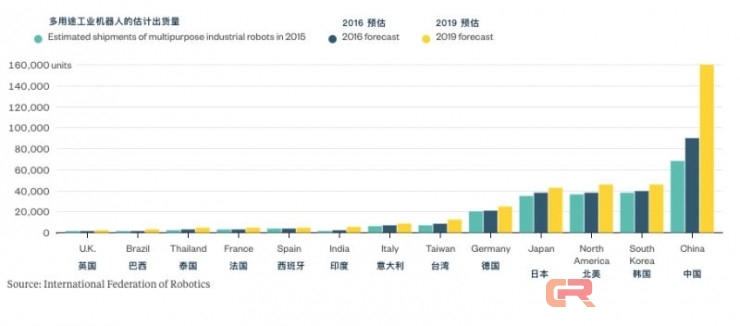
When the American middle class thrived after the Second World War, factory automation was expensive. Robots are limited to a few industries, mainly the automotive industry, and these robots are not that complicated. As productivity has been optimized to increase wages, robots have not made workers seem superfluous. Poor countries in Asia and Africa may not be so lucky. Today's robots are more advanced, can be deployed more widely in different industries, and are cheaper. This makes less room for wages to rise before humans leave the labor market, and lower-cost automation means that manufacturing can be moved back to developed economies. Last year, the German robot manufacturer kuka AG, which was acquired by China's Midea Group, estimated that the typical industrial robot costs about 5 euros per hour ($5.28). Manufacturers in Germany hire one person for 50 euros an hour, and in China about 10 euros an hour. This highlights a key point - companies can recoup their spending on automation equipment: According to Macquarie's report, the payback period for Chinese automotive welding robots has dropped to less than two years. Instead of looking for a cheaper source of labor elsewhere (another emerging Asian market), Chinese manufacturers are choosing to install more robots, especially for highly complex jobs. As Bernstein analysts recently said, China is not a job but a worker. This may be the reason why manufacturing employment has already peaked in many emerging economies. It occurs at a time when the overall employment rate is lower and economic development is earlier - this trend is called "premature deindustrialization." To be clear, this is not an argument against science and technology. Smartphones provide users with access to most of the world’s knowledge, and the increase in the number of mobile phones is a ticket to the service industry. However, service industries (such as Uber drivers)—whether the wages are reasonable or whether they are guaranteed like the production line—are open questions. These service industries will also be threatened by automation - driverless cars are a threat to taxi drivers. Good service competition between service industries will only become more intense and wages will remain unchanged. All in all, robotics may exacerbate inequality in low-income countries.

Even business leaders who benefit from greater automation and digitization are increasingly concerned about potential negative consequences. In Germany, the CEOs of Deutsche Telekom AG and Siemens AG have recently provided some form of basic income for those who are replaced by technology. Trump may not support this approach, but he still must face the consequences: a very small number of manufacturing companies will return to the United States and will not generate more job opportunities elsewhere.
PAR Lamps,High Power,LED Lamp
Qianghui Lighting Electronic Appliance Co., Ltd. , http://www.ledelamps.com
没有评论:
发表评论